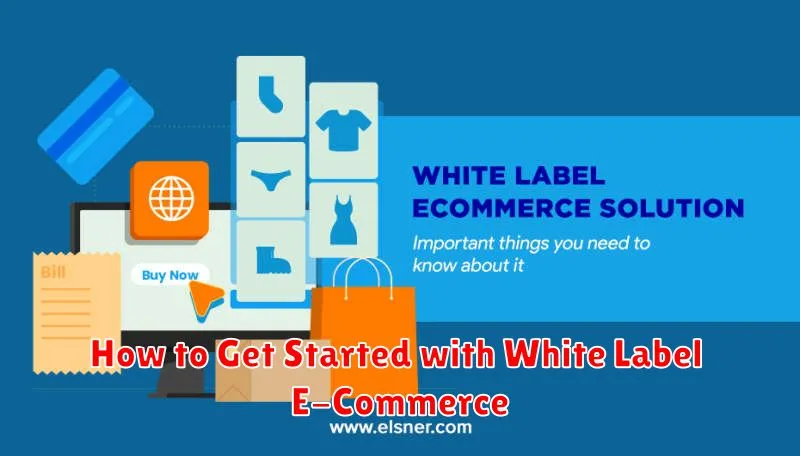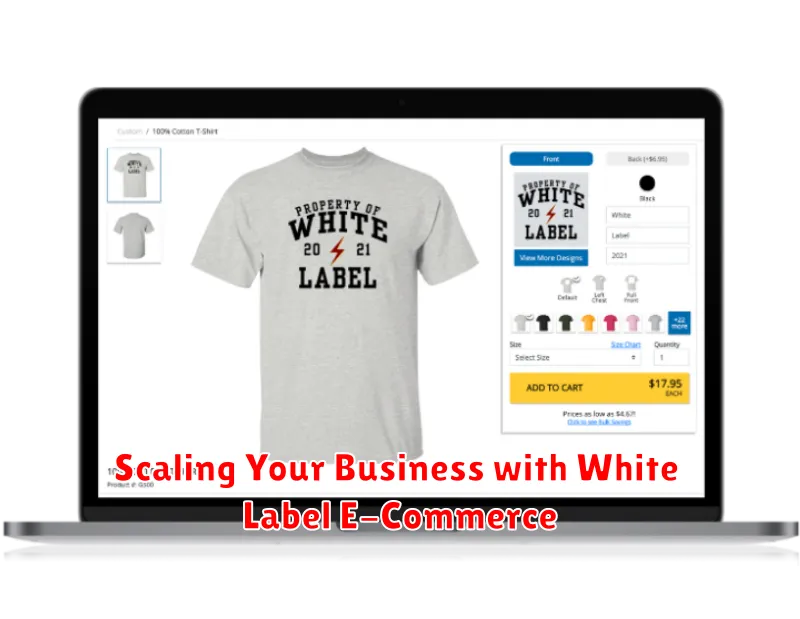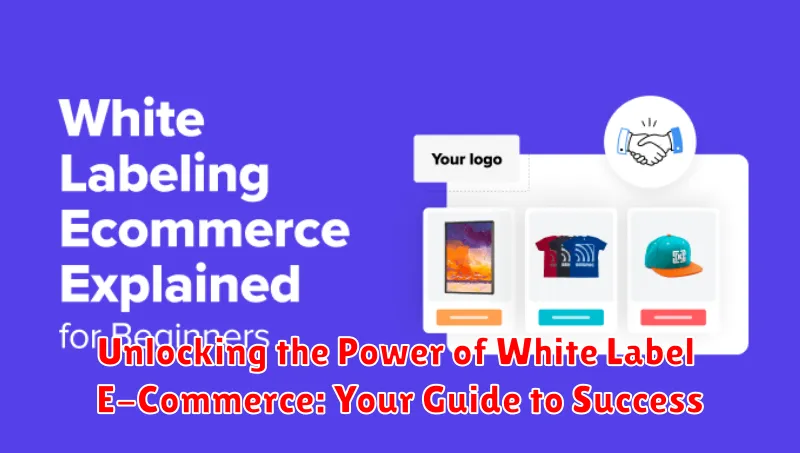In today’s dynamic digital landscape, establishing a thriving online presence is paramount for businesses of all sizes. White label e-commerce offers a powerful and efficient solution, empowering entrepreneurs to launch and scale online stores quickly and cost-effectively. This comprehensive guide delves into the intricacies of white label e-commerce, providing you with the essential knowledge and strategies to unlock its full potential and achieve sustainable success. Whether you’re a startup seeking a streamlined entry into the online marketplace or an established business looking to expand your reach, understanding the nuances of white label e-commerce solutions is crucial for maximizing your online revenue potential.
This guide will explore the core benefits of leveraging a white label e-commerce platform, including reduced development time and costs, access to pre-built functionalities, and the ability to focus on core business competencies like branding and marketing. We’ll cover crucial aspects such as selecting the right white label e-commerce software, customizing your online store, optimizing for conversions, and implementing effective marketing strategies. By the end of this guide, you will be equipped with the insights necessary to navigate the world of white label e-commerce and build a successful online business.
Understanding White Label E-Commerce
White label e-commerce refers to a business model where you sell products or services online using a pre-built platform that you can customize and brand as your own. Essentially, a third-party provider develops and maintains the underlying e-commerce infrastructure, including the website, hosting, payment processing, and often even order fulfillment.
This allows you to focus on marketing and sales, rather than the technical complexities of running an online store. Think of it like buying a generic product and adding your own label and branding to it. You get the core functionality without having to build it from scratch.
Key aspects of white label e-commerce include the ability to customize the storefront’s design to match your brand, set your own pricing, and manage your inventory. While you don’t own the platform itself, you have significant control over the customer-facing aspects of the business.
Benefits of Choosing a White Label Solution
Leveraging a white label e-commerce solution offers a multitude of advantages, allowing businesses to quickly establish an online presence and capitalize on market opportunities. A primary benefit is the reduced time to market. Instead of building a platform from scratch, businesses can utilize a pre-built solution and focus on branding and customization.
Cost savings are another significant advantage. Development, maintenance, and ongoing upgrades are handled by the white label provider, freeing up resources for other crucial business activities. This also allows for scalability as the business grows. The platform can adapt to increasing demands without requiring significant investment in infrastructure.
Finally, a white label solution enables businesses to focus on their core competencies. By outsourcing the technical aspects of e-commerce, businesses can dedicate more time and energy to product development, marketing, and customer service, ultimately enhancing the customer experience and driving growth.
Key Features to Look for in a White Label Platform
Selecting the right white label platform is crucial for your e-commerce success. Flexibility is paramount; the platform should allow for extensive customization to reflect your brand identity. Look for robust product management capabilities, enabling efficient catalog updates and inventory control. Order management features should streamline processing, fulfillment, and tracking.
Payment gateway integration is essential, offering your customers a seamless checkout experience with various payment options. Consider the platform’s scalability; ensure it can handle growth in traffic and sales volume. Customer support features, including live chat or email integration, are crucial for addressing customer inquiries.
Finally, prioritize platforms with comprehensive analytics and reporting tools. These features offer valuable insights into sales data, customer behavior, and overall platform performance, enabling data-driven decision-making.
How to Get Started with White Label E-Commerce

Launching your own white label e-commerce business involves a structured approach. Begin by defining your niche and target audience. This crucial step informs your product selection and overall brand strategy.
Next, thoroughly research potential white label platforms. Compare pricing, features, and customization options to find the best fit for your business needs. Consider factors like scalability, integrations, and payment gateway options.
Once you’ve selected a platform, customize your storefront. This includes branding elements like your logo, color scheme, and domain name. A unique and professional appearance is vital for building trust and brand recognition.
Product selection is the next critical step. Choose products that align with your niche and target audience. Ensure product quality and reliable suppliers for a positive customer experience.
Finally, launch and market your store. Develop a comprehensive marketing strategy that includes social media marketing, search engine optimization (SEO), and paid advertising to drive traffic and generate sales.
Top White Label E-Commerce Platforms
Selecting the right platform is crucial for your white label e-commerce success. Several leading platforms offer robust features and scalability.
Some popular choices include:
- Platform A: Known for its extensive customization options and robust API integrations.
- Platform B: Offers a user-friendly interface and comprehensive marketing tools.
- Platform C: Specializes in specific niches, providing tailored solutions for businesses with unique requirements.
- Platform D: Provides a balance of affordability and essential features, making it a good starting point for smaller ventures.
Researching these and other platforms will help you determine the best fit for your business needs and budget. Consider factors like pricing, scalability, integrations, and support when making your decision.
Integrating Your Brand with a White Label Solution
Seamlessly integrating your brand into a white label e-commerce platform is crucial for a successful online presence. This involves several key steps to ensure a cohesive and consistent brand experience for your customers.
Customize the User Interface (UI): Adapt the platform’s appearance to reflect your brand’s visual identity. This includes incorporating your logo, color scheme, and typography.
Tailor the User Experience (UX): Design the customer journey to align with your brand values. Consider navigation, checkout processes, and overall site functionality.
Product Presentation: Showcase your products with high-quality images and descriptions that resonate with your target audience. Maintain consistency with your brand voice and messaging.
Domain and Email Integration: Utilize your own domain name and branded email addresses for a professional and recognizable online presence. This reinforces your brand identity and builds trust.
Scaling Your Business with White Label E-Commerce

White label e-commerce offers significant advantages for businesses looking to scale rapidly. By leveraging an existing platform, you bypass the time-consuming and costly process of building your own infrastructure from scratch.
This allows you to focus resources on core business functions like marketing and product development. As your business grows, a white label solution can easily accommodate increased traffic and order volume, ensuring a seamless customer experience even during peak periods.
Furthermore, many white label platforms offer flexible pricing models that scale with your business, making it a cost-effective solution for growth. You can start small and gradually expand your operations without incurring significant upfront investments.
Quick adaptation to market changes is another key benefit. White label platforms often incorporate the latest technologies and features, allowing you to stay competitive without continuous development efforts. This agility empowers you to capitalize on emerging trends and expand your product offerings efficiently.
Common Misconceptions about White Label E-Commerce
Several misconceptions can cloud the understanding of white label e-commerce. Addressing these is crucial for making informed business decisions.
Myth 1: Limited Customization
One common misconception is that white label solutions offer limited branding and customization. In reality, reputable platforms allow extensive visual customization, enabling businesses to maintain a consistent brand identity.
Myth 2: Lack of Control
Some believe white label solutions equate to a loss of control. While the platform provider manages the backend infrastructure, businesses retain control over key aspects like pricing, marketing, and customer service.
Myth 3: Inferior Technology
Another misconception is that white label platforms are technologically inferior. Modern white label solutions offer advanced features, including robust analytics, secure payment gateways, and mobile-friendly interfaces, comparable to custom-built platforms.

